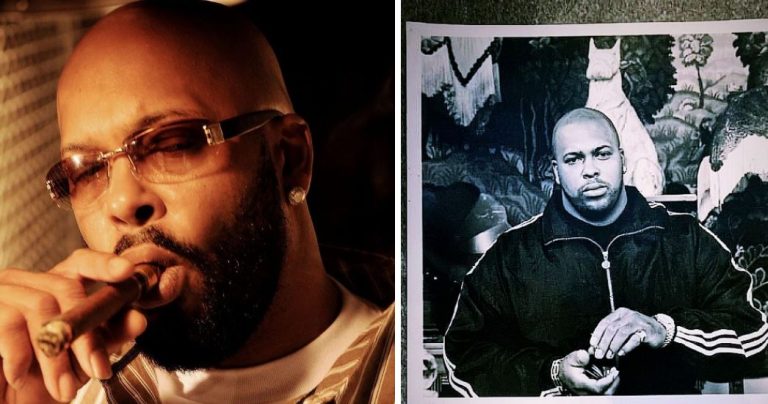In addition to the physical change, Suge Knight’s reported weight loss has garnered renewed attention because of the circumstances surrounding it. His weight loss during his incarceration—from over 350 pounds to about 315 pounds—seems to have been more a result of necessity than self-control. The loss felt less like a health decision and more like a warning sign because, as he admitted in court, the abrupt change was directly linked to struggles with injuries and a serious lack of medical care.
Knight informed the judge during a 2015 court hearing that he was almost blind, with one eye being completely blind and the other partially blind. In addition, he mentioned untreated pain from several gunshot wounds, a blood clot in his lungs, and a general feeling of medical desertion. He puked into a trash can just after the hearing began. A stark reminder of the declining condition of a man who was once thought to be untouchable, that scene was almost cinematic in its bleakness.
Suge Knight – Personal and Professional Information
| Attribute | Information |
|---|---|
| Full Name | Marion Hugh “Suge” Knight Jr. |
| Date of Birth | April 19, 1965 |
| Age | 60 |
| Birthplace | Compton, California, United States |
| Occupation | Former Music Executive, NFL Player, Record Producer |
| Known For | Co-Founder & CEO of Death Row Records |
| Years Active | 1987–1996; 2001–2015 |
| Criminal Status | Incarcerated (Richard J. Donovan Correctional Facility) |
| Sentence | 28 Years (Eligible for parole in 2034) |
| Children | Suge Jacob, Bailei, Posh, Taj, Andrew Knight |
In particular, his decline has been symbolic. Suge Knight was more than just a record executive in the 1990s; he was a kingmaker. He was the inspiration behind Tupac’s All Eyez on Me, Doggystyle, and The Chronic. His voice dictated fear, and his body demanded attention. However, over time, legal pressure, cultural change, and personal collapse have caused what once seemed to be an empire based on dominance to fall apart.
Knight made Death Row Records one of the most significant labels in hip-hop history by combining corporate bluster with street cred. However, the same violence that gave him authority also revealed a risky weakness: a dependence on coercion that eventually caused him to become isolated. Knight’s brand of bravado became outdated as rap music, spearheaded by artists like Kendrick Lamar and J. Cole, moved toward introspection and therapy. Furthermore, he was culturally as well as physically removed by his incarceration.
Even though his weight loss is quantifiable, it conveys a powerful message about something intangible: the demise of a myth. Knight recalled the night Tupac was shot in recent interviews conducted from his cell. He uttered the words, “A part of me died when he died,” with a voice full of regret that seemed both sincere and long overdue. Given Knight’s current status—isolated, elderly, and, as evidenced by his court appearances, growing frail—the quote struck a powerful chord.
This change has been compared to other strong men whose demise was made public. A warning about the abuse of power was made by Harvey Weinstein, whose health deteriorated during his legal proceedings. Former mob bosses like Vincent Gigante also lost strength while incarcerated. Their journey is similar to Knight’s—significantly different in context, but remarkably similar in terms of symbolic breakdown.
Knight’s health is deteriorating not just as a result of aging, but also because of untreated injuries, ongoing stress, and reportedly little medical intervention, according to reports from The Guardian and Yale CampusPress. The decline is frequently even more pronounced for those who are incarcerated, particularly those with prominent public profiles. Their bodies end up serving as testaments to structures that disregard long-term health.
This raises a topic that is especially pertinent today: the state of healthcare in prisons and prisons. Knight’s obvious deterioration—weight loss, blurred vision, blood clots—highlights the glaring discrepancy between what is available and what is medically required. Although incarceration restricts freedom, dignity shouldn’t be lost. His story is frighteningly typical of how delaying or refusing proper care can drastically impair physical health.
Setting the story against the backdrop of his former dominance gives it even more emotional weight. Previously pictured wearing elegant suits, surrounded by bodyguards, and conversing with both political activists and record executives, Knight is now more frequently remembered for his medical complaints and hospital stays. Furthermore, Knight’s path has remained unchanging, characterized by quiet and physical deterioration, in contrast to his former peers—Diddy, Dr. Dre, and even Snoop Dogg—who have embraced reinvention.
Knight fired his lawyers in the middle of the trial, saying he didn’t understand what was going on in court, which was a particularly telling moment. A picture of a man who is not only fading but also perhaps lost in a system bigger than he ever imagined is painted by that mental fog and his declining health. Paradoxically, the legal, cultural, and musical structures he once controlled now appear to be devouring him.


